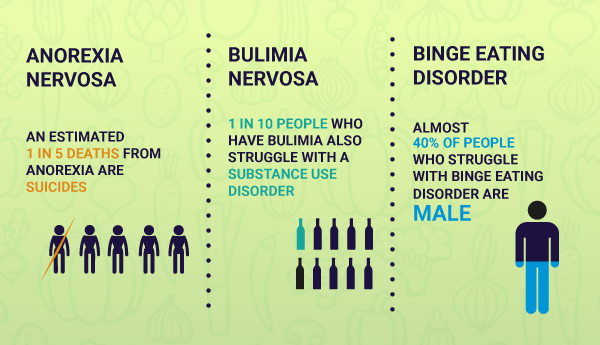Eating Disorder Recovery Can Be Fun For Everyone
Wiki Article
More About Eating Disorder Recovery
Table of ContentsWhat Does Eating Disorder Recovery Do?The Buzz on Eating Disorder RecoveryNot known Facts About Eating Disorder RecoveryEating Disorder Recovery Things To Know Before You Get ThisWhat Does Eating Disorder Recovery Mean?
:max_bytes(150000):strip_icc()/VWH_Illustration_Considerations-for-Eating-Disorder-Recovery_Tara-Anand_Final-4a3e3f419ac24a04a93c36f4178a0f5f.jpg)
Orthorexia is a form of eating disorder, still unacknowledged in the DSM, where an individual comes to be obsessed with "healthy and balanced consuming." While lots of people make a point to be knowledgeable about the ingredients as well as sourcing of their food, orthorexia can come to be destructive to the individual's health and wellness. Orthorexia creates people to identify specific food or food teams as "appropriate," "healthy and balanced," or "pure." At some point, specific foods or whole groups are removed from the individual's diet; they could likewise begin to stress over the components in their foods, investing hours each day preparation meals (eating disorder recovery).
Food ingredients might also become the individual's only subject of discussion. Wellness consequences may consist of a variety of stomach and dietary imbalances. It can likewise create much of the exact same health dangers as anorexia, as the individual's caloric intake might be drastically restricted. Orthorexia is likewise an usual co-occurring disorder connected with OCD.
The Facts About Eating Disorder Recovery Revealed
With this problem, an individual will purely prevent specific foods to the detriment of their health and wellness - eating disorder recovery. Unlike orthorexia, nevertheless, the evasion of specific foods isn't driven by concepts of the food's healthiness or pureness, yet instead by an extreme hostility to the food's flavor, structure, or odor (although concerns about putridity or food poisoning may likewise exist).Over time, increasingly more foods become untenable, bring about a very limited combination of acceptable foods. Formerly understood as careful eating condition, ARFID typically starts in childhood as well as considerably worsens in time. It's relatively common for kids to be "choosy eaters" and everyone has choices of what they consume, yet if it becomes compulsive and also damaging to an individual's health and wellness, it necessitates a check-in with an eating condition treatment professional.
Like orthorexia, an adverse or distorted body photo is not necessarily a reason of the disorder. ARFID is generally treated utilizing talk treatment as well as cognitive re-training such as Cognitive Behavior Treatment (CBT). Unlike most eating conditions which typically initially present during teenage years, rumination disorder is most typical in early stage as well as very early childhood, although it can continue right into their adult years.
The 8-Minute Rule for Eating Disorder Recovery
Usually, they do not experience stress and anxiety or disgust when regurgitating, nor do they show up to make an initiative to throw up (as seen in bulimia nervosa). Rumination condition is commonly a response to an illogical anxiety of health problem brought on by consuming, although its causes are less well-understood than various other eating problems.

While lots of people make a point to be mindful of the components as well as sourcing of their food, orthorexia can become destructive to the person's health and wellness. Ultimately, specific foods or entire groups are gotten rid of from the individual's diet plan; they might also begin to stress over the components in their foods, investing hours each day planning dishes.
Eating Disorder Recovery for Beginners

With this condition, an individual will strictly prevent particular foods to the hinderance of their health. Unlike orthorexia, nonetheless, the avoidance of specific foods isn't driven by click ideas of the food's healthiness or pureness, yet instead by a severe aversion to the food's taste, appearance, or smell (although concerns concerning putridity or food poisoning may additionally be existing).
Over time, an increasing number of foods become untenable, leading to an extremely restricted scheme of appropriate foods. Formerly called careful eating disorder, ARFID often begins in youth as well as gradually intensifies gradually. It's fairly typical for kids to be "choosy eaters" and also every person has preferences of what they eat, but if it ends up being compulsive and detrimental to a person's health and wellness, it necessitates a check-in with an eating condition therapy expert.
Fascination About Eating Disorder Recovery
Additionally like orthorexia, a negative or distorted body picture is not necessarily a source of the problem. ARFID is generally dealt with making use of talk therapy as well as cognitive re-training such as read this post here Cognitive Behavioral Treatment (CBT). Unlike most eating conditions which normally first present during adolescence, rumination problem is most usual in early stage and also early youth, although it can continue into the adult years.Usually, they do not experience anxiety or disgust when spitting up, neither do they show up to make an initiative to throw up (as seen in bulimia nervosa). Rumination disorder is frequently a response to an unreasonable fear of illness triggered by consuming, although its reasons are much less well-understood than various other eating conditions.
Rumination problem is noted in the DSM-V. Diabulimia is listed as one of the lots of unspecified eating conditions under the catchall term OSFED (Other Specified Feeding r Eating Disorder).
Report this wiki page